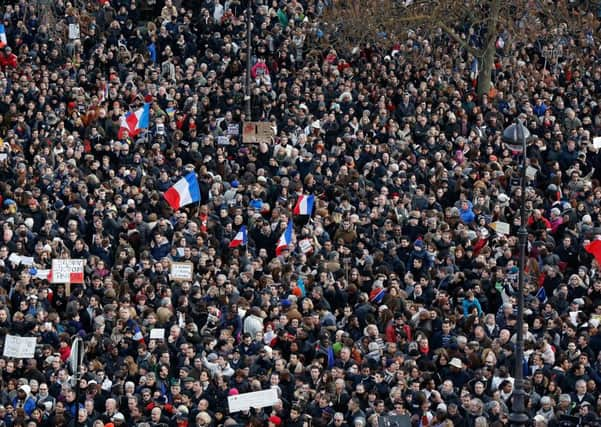Leader: French march displays masses of solidarity


The brutal killing of 17 people in three days of slaughter in Paris has appalled the country and united hundreds of millions across the world. The loss of life and the courage shown by citizens in the face of this barbarism has unleashed a wave of solidarity without modern precedent.
The loudest applause yesterday was reserved for members of the victims’ families. This spontaneous salute resonated across the city, a response of sympathy and condolence on a scale that no speeches from world leaders could begin to match.
Advertisement
Hide AdAdvertisement
Hide AdThese extraordinary scenes, echoed in similar demonstrations in towns and cities across France estimated to have mobilised another 2.5 million people in addition to the mass of Parisians who took to the streets of the capital, marked a cathartic moment after three days of terror.
But it was also a political statement to Muslim extremists that, try as they might to terrorise France from its commitment to liberty and freedom of expression, millions will rise up to defend these values.
France now faces a pivotal moment. The days and weeks ahead will be a test of the country’s ability both to show its defiance at what has happened and at the same time to demonstrate its restraint.
Much now has to be done to tighten surveillance and security to help ensure such murderous outrages are not repeated and that French citizens are given protection from attack. This is the first duty, not only of the French Republic, but of all western governments. Such measures will try the patience of citizens at airports, naval ports and railway stations. And demands for tighter surveillance will almost certainly impinge on citizens’ right to privacy. Never has it been more difficult – but yet more necessary – to secure a balanced response that meets the need for effective security while still engaging democratic support and compliance.
That the assassins were known to western intelligence and that one had already been imprisoned for terrorist activity cannot but trigger searching questions as to how they were allowed to continue their activities in the mainstream of civil life and to plot a double-headed attack that stretched the French police to the uttermost.
Greater international co-operation will certainly be needed. But it is a mature and thoughtful response by the people of France in the coming days that now matters most of all.
Polls, pacts and permutations
Every day closer to the May election brings intensifying focus on the likely aftermath of a hung parliament and the permutations of a governing alliance.
With Alex Salmond having ruled out a deal with the Conservatives, it is possible a resurgent SNP with 20 seats or more could strike a deal with Ed Miliband that would put Labour in power. Such a prospect is unlikely to cool the street-level ferocity between the two.
Advertisement
Hide AdAdvertisement
Hide AdIt is an outcome that has moved fractionally closer with the Labour leader’s refusal yesterday to rule out a deal. It is too early for such an outcome to be regarded as anything other than one of a number of outcomes. It is the voters who will determine the balance of forces. But such an outcome cannot be ruled out. It would pose major problems for Mr Miliband if the price of his ticket to Downing Street includes a deal, formal or otherwise, with the SNP.
It also portends a major reaction south of the Border if, as is also possible, Miliband becomes prime minister despite Labour failing to secure the majority support of voters in England. Many would query the legitimacy of an outcome in which the UK premiership was effectively determined by the SNP. Such a deal with the SNP could well propel Miliband into Downing Street.
Another outcome could be a second election later this year. But it is doubtful the Conservatives would vote against Labour’s Finance Bill, however unpalatable, and trigger a second election without being sure it could win. Market reaction, meanwhile, could see a major sterling sell-off without early clarification.